#like we're miles ahead of some places but SO BEHIND every other country with socialized medicine
Text
a return to roots | 5
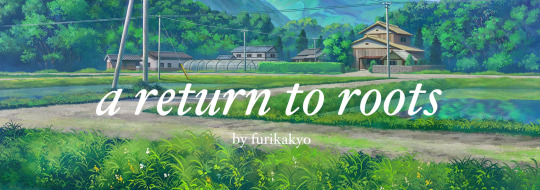
pairing: kita shinsuke x f!reader
summary: y/n is a rising star in the music industry, having almost everything you could have ever hoped for as a small-town country girl. now after releasing two triple platinum albums in consecutive years, you face the dreaded artist’s burnout… in order to recover, your manager suggests, you should return to your hometown in hyōgo for a long-deserved break.
genre: socmed/smau, slice of life
warnings/tags: timeskip!, mutual pining, slow burn? more like rekindling, slight canon divergence
masterpost

Ichiro arrived right on time at 5:45 in the morning, buzzing your door just as you had gotten dressed after a quick shower. Steam wafted out of the bathroom as you rushed to the door to greet him and show him where the luggage was. Without anything to say, he promptly picked up one of the large hard case suitcases and you followed suit, going after him into the elevator. When your bodyguard loaded both of your cases into the trunk of his car and then opened the door for you to get into the car, you quickly said, "I need to double check everything in there is fine. I'll be back in a minute."
After reassuring Ichiro that you would be ok by yourself, you dashed back inside to survey your apartment, checking each room to make sure you hadn't left anything important behind. The kitchen and living room were clean, check. When you got to your bedroom, you paused, seeing one of your acoustic guitars sitting in the corner. Should you bring it? Were you actually going to write music? When you had announced your hiatus officially, you had stated that it was to gain inspiration for new music... but then that wouldn't really be a break, would it? You gnawed on your lip, remembering what Kuroo had asked of you the night before: "Take care of yourself in Hyōgo, alright? You're there for a reason; to take a break."
You scowled, cursing Kuroo and his knowledge of your work habits. But, a voice inside you reasoned, it wouldn't be work if you were writing just for fun... You thought back to those moments in your childhood home, in your room, writing songs and uploading them to YouTube and SoundCloud without thinking that anything would come of it; back before you felt any pressure to perform. Back to when you wrote lyrics that weren’t very sophisticated, but earnest and heartfelt all the same… back to when you had your muse to sit beside you every step of the songwriting process.
Before you could convince yourself otherwise, you ran to the corner of your room and snatched the guitar, put it in its case, and then snapped it shut with finality.
If Ichiro was confused about you carrying down another piece of luggage, he said nothing, only staring ahead and driving when you were buckled. "Onigiri Miya," you reminded him, then settled into your seat. The ride there wasn't too far from your apartment; you had rented out the space because of its convenience, so anywhere you usually wanted to go to was within a reasonable distance. You watched the traffic with disinterest and spotted restaurants with dim lighting inside, most likely already prepping for the day ahead of them. The world kept moving on ahead, regardless of whether or not you liked it.
When you arrived at Onigiri Miya, Osamu was already out back in the van, probably waiting impatiently. You checked the clock in the car and clicked your tongue. You weren’t even late.
When you stepped out of the car, Osamu opened his door and got out too. You smiled widely. “Samu!” You rushed forward and gave him a strong hug, which he somewhat reciprocated. He wasn’t as big on physical touch as his brother.
Osamu only rolled his eyes though, patting your back as you told him he looked great. “You do, too. Want me to help with your bags?”
You led him to the trunk of your ride, where Ichiro was already opening it and carrying one of your suitcases. Osamu hefted the other one up, and you trailed behind with the guitar case. After securing everything in the back of the van, you turned to your bodyguard.
You smiled, a genuine smile, and then repeated what you’d already told him over text. “Well, Ichiro-san, I don’t know the next time I’ll see you. I’ll make sure to text you in advance if I plan on going to more public areas.” He said nothing, so you continued. “Thank you very much for all you’ve done for me, and I look forward to seeing you again in the future!” You gave him a bow, which he reciprocated stiffly before quickly getting back into his own car and driving off.
You sighed, then looked to Osamu. He quirked an eyebrow. “Ready?” You nodded determinedly, getting into the passenger seat of the van and buckling, him doing the same.
“Alrighty, then,” he cracked a grin. “Time for a road trip.”
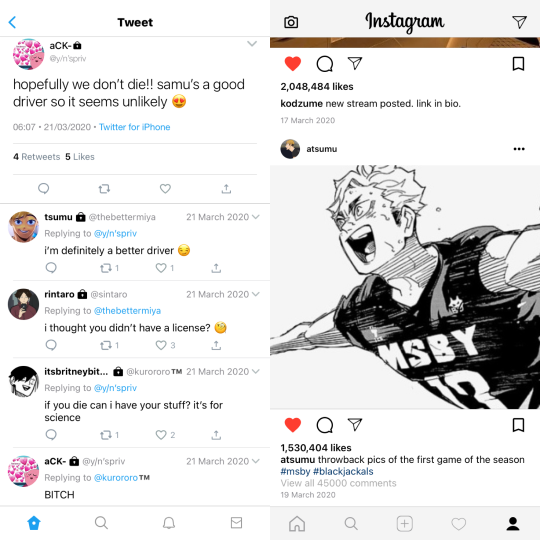

After a while of scrolling through your social media accounts you sat back and stretched. Then you flopped back into your seat and looked over to Osamu. “Samu,” you whined in the most obnoxious voice possible, “do you have any food? I’m so hungry.”
Osamu rolled his eyes, jerking a thumb towards the back of the van. “Ya really think I wouldn’t bring food for the trip?”
Immediately, you turned around and began looking behind your seat for food. Sure enough, there was an insulated bag with onigiri. You gasped, bringing the bag into your lap with stars in your eyes. “You brought some?”
You ignored whatever his response was, instead unwrapping one and biting into it. “Mmm,” you moaned, chewing slowly. The nori was still crisp and the rice was fluffy yet still sticky. You closed your eyes to focus on the food. He must have made them right before you got there for them to be this fresh.
“I’m guessing you didn’t eat breakfast, then,” Osamu said, eyes staring ahead at the road.
Your grip on the rice ball tightened before you quickly realized what you were doing. Your apartment didn’t really have much left to eat after you’d finished up the gyoza last night, and even if you’d had food, you weren’t sure if you would’ve been able to keep it down. Butterflies had filled your stomach as you had tried to go to sleep, and they hadn’t really disappeared yet. “No,” you shook your head. “I woke up early in the morning and was tired.”
Osamu hummed and then didn’t say anything else. After another long beat of silence you squirmed in your seat, a little on edge. “Mind if I play some music?” He shook his head at your question and so you took over the AUX, playing some songs that had been stuck in the back of your mind lately. After the music started, any awkwardness immediately dissipated as you sang along and Osamu tapped his thumb on the wheel to the beat of whatever was playing. At one point you had even pointed out his cute habit to which he had denied before doing the same thing twenty minutes later. Giggling, you just looked out the window and didn’t comment on it that time.
After about an hour of songs, Osamu finally spoke again. “You can go back to sleep, if you want. Ya look tired.”
You looked over at him and then nodded, curling into yourself, rubbing your wearied eyes. Sleeping would be a good opportunity since you hadn’t gotten much last night. You leaned against the seatbelt and window and closed your eyes, ignoring the bumps in the road which made your head hit the glass each time. Before you knew it, you were asleep.
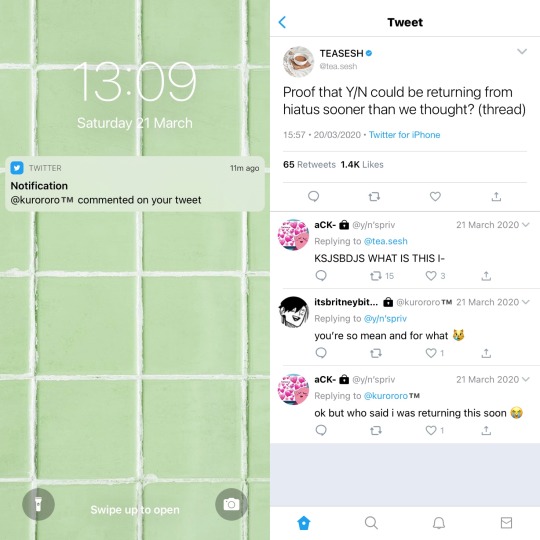
After a little less than five hours, you woke up to Osamu driving, now playing the radio instead. You looked outside. Gone were the skyscrapers and bright lights; in their place were rows and rows of empty fields, all blurring past you. "Are we in Hyōgo yet?" you asked, turning back to him.
Osamu gave you a quick glance and then switched his gaze back on the road. It was just the Onigiri Miya van on the stretch, the rest of what you could see of the roadway completely devoid of another vehicle. "Yeah," he replied. "We have about an hour left. I was gonna stop at the next place to stretch, though." He looked over at you again. "Is that alright with you?"
You nodded and then dug out another rice ball from the thermal bag, munching on it as you stared out the windshield. The nori wasn’t crispy anymore but at least the filling was still yummy. "So we're going to stop somewhere first. What's the plan after that?"
Osamu adjusted his grip on the wheel, driving with only one arm. "I was thinking that we could stop by your house, unload your luggage, maybe clean up your space since no one's been there for a while, and then go to do my business in Hyōgo." He paused, then added, "With Kita."
Your heart raced. It was your first day back and you were already going to have to face Kita. You could just stay home, a voice nagged at you. No, you thought, your face filled with grim determination. You could do it.
Almost as if sensing your internal strife, Osamu said, "Y'know, Y/N, I think Captain is just as nervous, if not, more." He continued staring ahead, not looking at you. Now he started tapping his thumb against the wheel again.
But you, your head snapped to look at him. "Really?" you asked, eyeing him skeptically.
Osmau nodded, smiling. "He's barely said a peep in the group chat he's in with me. Although now that I think about it, that's usually how he is." He chuckled. "Unless he's getting in between me and Tsumu."
You sighed, sitting back. Why had you expected Kita to hold anger towards you? Because you chose a career over him? Because you chose success over two of you, the voice in the back of your mind whispered. You ignored it, crossing your arms. You felt bad for thinking he would be anything less than how he always was in your mind (he was always Mr. Perfect), but it also made you feel better knowing he was scared too. No, not scared. Nervous, Osamu had said. Oh, god, how were the two of you going to act when you saw each other?
"Hey, Y/N." You turned to Osamu just as he pulled into the driveway of probably the only gas station within a 50 mile radius. He smiled, the corners of his eyes crinkling. "You'll figure it out."
As you followed him out of the van to stretch out your legs, you could only hope that you would figure it out. Preferably before you had to see Kita.


You had, in fact, not figured it all out by the time you and Osamu reached your childhood home. Instead of thinking about your lack of a solution, you resorted to reaching under the dingy welcome mat and pulled out a plastic bag with a key inside. “Still here,” you said cheerfully, showing the dirty bag off to your friend.
Osamu rolled his eyes and waited as you fumbled with the key to the house and then eventually opened the door.
You peered into the dark corridor and slipped off your shoes before stepping onto the hardwood floor. “I called the electricity and water guy,” you muttered, dragging one of the suitcases behind you. You paused and then grabbed the handle, which extended, then let the suitcase’s wheels do the work for you. “Everything should be functional by the end of the day.” When you got to the end of the foyer, you gasped. “What…?”
The inside of the house was, contrary to your belief, not at all covered in a thick layer of dust like you’d expected. Instead, it looked almost exactly the same as when you had moved out from there.
Osamu trailed behind you, taking his cap off and scratching the back of his head. “To be honest, I forgot that this was happening. Everyone here didn’t want to see your house collect dust and fall apart, so they..." He motioned around him, your eyes following.
The tatami mats in the living room and your parents' bedroom were clearly cared for, otherwise there would’ve been the overwhelming scent of dust or mold. You could imagine the diligence it would’ve taken to clean them so regularly. And the furniture— you ran a finger along the top of the kotatsu and then looked at it; nothing. You’d have to move the kotatsu into storage since it wouldn’t make much sense to have it out right now; you only used it in the winter...
You drank in the rest of the house, mentally planning where to place things and what to rearrange to your own liking. "I'll get the other case you brought," Osamu muttered, sidestepping around you to reach the doorway. You barely noticed him leave as you crept to your own childhood bedroom, sliding open the shōji screen door.
…Huh. It didn't look any different from what you last remembered. You walked inside. You had your western-styled bed, which still had the furniture sliders under the legs to protect the tatami mats; the bookshelves along the wall with your favorite books and shōjo manga... You paused at the string of fairy lights strung above your dresser. Clipped onto them were photos from high school: you and Osamu proudly holding a double-tiered cake you'd made in home economics, you and a few of the other Inarizaki boys fooling around after practice, you with your parents in front of the school in your third year. You laughed to yourself while looking at them, recalling the moments in which the pictures were taken; back when Samu's hair was grey and Tsumu didn't know what toner was, back when your only responsibilities were as Y/N the assistant manager and co-class representative of 3-A.
You stared at the end of the string lights, where there was a picture missing. You knew what was supposed to be there, in that gap. You were unsure of where it had gone though, so you searched your entire bedroom, taking out all of the books in your shelves and turning them upside down, removing all of the drawers in your dresser and peeking inside the base. You scoured your belongings for a sign of where that photo could have been, but to no avail.
"You looking for something?" Osamu pushed off of the doorway he'd been leaning on and peered over your shoulder. "I can try to help ya find it."
You shook your head, smiling. "No, it's okay. I lost something but it's not that important." You stood up and dusted yourself off, brushing your hands together. "We have some free time now that I don't have to clean up around here. What should we do?"
Osamu nodded, thinking to himself. "Well, we could go reacquaint you with your neighbors… or we could get to the farm early. It’s,” he checked his phone, “around 3 right now so we would have a couple hours to check out the entire farm. It’s big, so having too much time on our hands wouldn’t be an issue.”
“Uh…” You bit your lip and stared expectantly at Osamu. You make the decision.
He lifted an eyebrow incredulously, then said, “Alright, farm it is.”


You dropped your phone into your lap in disappointment, tempted to just throw it out of the window of Osamu’s van. Kuroo really is kind of useless, huh, you thought, staring out of the window glumly.
The sound of the tires hitting gravel road caught your attention and you looked out the front windshield. You sucked in a breath. You were here. At Kita’s farm. Or rather, you thought, Kita’s house. You had parked in the driveway of his home which overlooked all the fields. They were still somewhat of a muddy brownish color from how far away you were.
“Ready?” Osamu tried to look grim, knowing of your inner turmoil, but his glittering eyes said otherwise.
You exhaled and then nodded. “Yes.”
The two of you didn’t end up getting very far along the fields before Osamu ran into someone he knew, probably someone else working on the rice fields under Kita based on the way he was dressed. He wore a wide-brimmed straw hat and, somehow, long sleeved shirts and pants. Osamu smiled, greeting the man, “Koji.”
His recipient smiled too. “Osamu. How’s business in Tokyo? Still thinking of opening another shop in Osaka?” Koji motioned for him to follow him down the path in between the rice paddies, and he did, already lost in a conversation. You watched as another group of workers came towards the duo, and you heard laughing and cheering as Osamu talked to them.
Well, damn. Osamu had left you behind. You looked around and then checked your phone. You still had basically two hours to kill. “Ugh…” Should you just wait in the van for Osamu? What if Kita saw the van pulled up and approached it, though? You did NOT want to be alone with him, just the two of you. Plus it would be hot waiting in there. You pulled at the front of your t-shirt. At least there was a slight breeze every once in a while when you were outside.
Am I really going to do this? You looked up at the sky and shielded your eyes from the sun. It was already beating down on your shoulders and back. Sighing, you started in the opposite direction of where Osamu and the workers had gone. There seemed to be a lot of property, you thought, admiring the view. Although the rice paddies were still muddy, the view you had from this side of the farmhouse was stunning. In the distance were lines of trees so dense, and mountains even further away, just a faint silhouette smoothed against the sky. You imagined what it would look like when the rice was ready to be harvested, all green and heavy with the fruits of labor.
A few days ago you’d thought absentmindedly that life had been kind to you, Kuroo, and Kenma. But now, looking around the serene landscape and close-knit community of workers, filled with a fresh green newness brought from only the spring, you wondered: maybe the years had been kind of Kita, too.
Behind you, you heard dull rustling, and you turned automatically. You froze, stunned. Your mouth moved and formed words before you could even comprehend what it was you were saying.
“Kita?”
a/n: ohhh my goodness i had the worst experience with a karen yesterday and i never thought i would have to deal with one for some reason…. fuck you amy and i hope i never have to see your bitchass face again
taglist (pm me to ask to be added): @papiibuprofen, @duhsies, @succulentmom, @kenmaslov3r, @introvertatitsfinest
some ~fun facts~
- ichiro the bodyguard/driver may or may not have shed a tear or two after y/n left. (i told you he was a big softie)
- he wanted to give you a hug goodbye but wasn’t sure if that would be overstepping 😔
- imagine samu loading the van with your luggage and pushing off the doorframe after previously leaning on it with his muscly arms and glorious tiddies… BEEFY SAMU SUPREMACY 🧎♂️
- one of osamu’s guilty pleasures is pop music 😭
- one of y/n’s fav things to do on social media is just go through atsumu’s public profiles and read the thirst comments 😭😭
#haikyuu#kita shinsuke#kita shinsuke x you#kita shinsuke x reader#kita x reader#kita 🧍♂️#miya atsumu#atsumu miya#haikyuu!!#inarizaki#kenma kozume#miya osamu#ojiro aran#kuroo tetsuro#suna rintaro#haikyuu x reader#farmer kita
43 notes
·
View notes
Text

FUTURE PLANET | SUSTAINABILITY
The Revival of a Historic Journey Across Spain
— By Kira Walker | 23rd September 2021
A resurgence in pastoralism, one of the world's more sustainable food systems, could help Spain adapt to climate change and revitalise depopulated rural areas.
As late May approached, the animals were growing restless. In little more than a day, the heat from the southerly desert winds had turned the grass dry, leaving Jesús Garzón's herd of 1,100 sheep and goats little to eat. Garzón knew – and the animals, nervous and bleating, knew as well – it was time to head north, where cool weather and fresh pastures awaited them.
Ahead lay an over 400km (250-mile) journey by foot across the Iberian Peninsula through heat, cold, wind and rain. Out of the winter lowlands west of Madrid, past crops of barley and wheat, through holm oak meadows speckled with juniper and rosemary, to forests of scots pines, where imperial eagles nest and black vultures breed. Continuing north through villages and cities into the territory of roe deer, wild boar and wolves, ascending plateaus and descending river valleys until, a month later, they would arrive at their summer destination: the mountain pastures in the Picos de Europa.
Every spring and autumn, Garzón and his herd make this seasonal migration, called transhumance – from the Latin trans for "across" and humus for "earth" – a form of pastoralism where animals typically move to and from summer highlands and winter lowlands to take advantage of seasonal peaks in pastures and avoid extreme temperatures.
After being abandoned for half a century, the recovery of transhumance in Spain demonstrates how pastoralism, a livelihood suited to coping with uncertainty and sustainable food systems, can help preserve biodiversity, while breathing life into depopulated rural areas.
Practiced by 200 to 500 million people across the world's rangelands – grasslands, savannahs, mountain pastures, tundra and steppe covering half the earth's land surface – pastoralism is significant socially, environmentally and economically. Yet misconceptions and an underappreciation of its benefits means it has been largely overlooked in international sustainability discussions and agendas.
As a herder who has also been at the forefront of efforts to revive this ancient practice and raise awareness of its importance, Garzón understands its potential, and its challenges, well.

Transhumant herds pass winters in lowlands where pasture and water are plentiful (Credit: TyN)
After thriving for hundreds of years, in the 20th Century modernity caught up with transhumance in Spain. Rail and eventually truck transport took its place, while many herders intensified production and settled. Long-distance transhumance up to 700km (435 miles) ceased to exist and the network of drove roads fell into disuse. For decades, only short journeys – transterminance – continued.
The end of transhumance in Spain had severe ecological impacts. Abandoned mountain pastures experienced biodiversity loss and heightened wildfire risk; lowlands suffered overgrazing and trees stopped regenerating.
It was the lack of new trees that brought Garzón, who previously worked in conservation, to transhumance. It was a turning point for him. At the time, he recalls, re-establishing transhumance was considered "totally impossible", but he persevered and in 1993 assisted Spain's first transhumance in more than half a century. Shortly after, Garzón founded the Association for Transhumance and Nature (TyN), which supports transhumant herders who face legal or logistical obstacles.
From the start, Garzón's objective was to recover Spain's drove roads, etched over centuries into the land, measuring 125,000km (78,000 miles) in length. Although pastoralism is practised in 75% of countries, Spain is the only country worldwide with a network of legally protected drove roads for the movement of herds. But Garzón's vision for transhumance extends well beyond the country's borders. "We're trying to transfer the Spanish example of a network of livestock trails, that herders can use freely, to the rest of the world," says Garzón.

Herds typically cover distances of 20km (12 miles) every day during the spring and autumn transhumance (Credit: TyN)
Leaving the lowland pastures west of Madrid behind, the high-rises of the city came into sight. But the state of the drove road Garzón travelled by deteriorated as it approached the city. In the years since herds had used it, cars and motorcycles had degraded the grassland and eroded the soil. With little pasture and water for the animals, it was not a place Garzón would normally linger in. The herd was here, however, with a specific mission: to help restore drove roads in the vicinity of Spain's capital.
While camping equipment, portable electric fences to corral animals overnight and vehicles to ferry supplies have made transhumance somewhat more comfortable, the journey remains difficult. Highways, crops and private land frequently encroach the roads. Finding places to overnight is tricky, and what shelters exist are often in disrepair, lacking water and sanitation facilities. Water sources for animals are few and far between, or broken; and herding hundreds or thousands of animals across highways requires coordination from authorities.
The poor state of the drove roads is a major obstacle challenging the viability of transhumance and preventing further revival. "If you don't have a way to get from point A to point B, no matter how much you want to do it, you're not going to be able to do it," says Maria Fernandez-Gimenez, professor of rangeland ecology and management at Colorado State University.
Recognising this, the Life Cañadas project was launched to recover the ecological role of drove roads in Madrid and the region of Castile-La Mancha, improve connectivity between landscapes and help herders with problems they face. With the collaboration of herders like Garzón, herds are being reintroduced to facilitate restoration.
Drove roads function as ecological corridors and provide a refuge for plants and animals, says Francisco Azcárate, project coordinator and professor at the Autonomous University of Madrid. As herds migrate, mimicking the role of natural grazers, they disperse seeds, connecting habitats and preserving biodiversity. In Spain, each sheep transports 5,000 seeds and fertilises the land with 3kg of manure daily. "In Europe, nature needs herbivores that don't exist nowadays [and] a way of grazing the landscape that is very similar to what transhumance does," Azcárate says. "You need to work with livestock, move the animals and plan on a seasonal basis the management of territory."
The project will also repair water points and shelters. "We have hope that if we can solve some of these main problems, people will continue to do the transhumance, or other[s] can join in the future," says Azcárate.
To monitor changes, the team will measure soil properties, conduct biodiversity surveys of flora and fauna and sample grassland communities in experimental and control plots. To Azcárate's knowledge, this is the first project in Spain to attempt to physically restore drove roads.

Drove roads around the country are in bad condition after decades of abandonment, encroachment and inappropriate vehicle use (Credit: Life Cañadas)
Through grazing, pastoralism provides further benefits to the ecosystem. So long as a threshold of overgrazing is not crossed – which seasonal migration helps avoid – grazing stimulates plant growth, increases productivity, reduces soil erosion and facilitates water retention.
Grazing also helps reduce wildfire risk and lessen the intensity of fires that do break out, says Elisa Oteros-Rozas, a researcher at the Open University of Catalonia. "When pastoralism disappears, biomass accumulates," she says. "And that makes ecosystems more vulnerable to large-scale wildfires." In areas prone to wildfires, like the Mediterranean, grazing could be a cost-effective prevention method – especially as more and bigger wildfires are predicted due to climate change.
More recently, grazing is being touted as a solution to climate change. However, the extent to which grazing contributes to climate mitigation is the subject of much debate. Some researchers argue grazing has significant potential to increase long-term carbon storage. Estimates of how much sequestration is possible vary widely. One study by the UN Food and Agricultural Organisation suggests improved grazing management of the world's grasslands could sequester 409 million tonnes of CO2 equivalent per year – equating to 1.1% of annual anthropogenic carbon emissions.
Other research argues ambitious climate mitigation claims about grazing are wrong. A 2017 report by the Food Climate Research Network writes that while better grazing management is worthwhile for reasons like soil health, biodiversity and erosion control, overall, it is not a significant solution for climate change. The report suggests grazing management offsets between 20-60% of annual average emissions from the grazing sector, which accounts for only a small fraction of all livestock, making an insignificant dent on total livestock emissions. The same report also suggests that the carbon benefits of grazing management will diminish over time, as the soil becomes less efficient at sequestering carbon.
Unlike industrial farming, which relies on fossil fuels, chemical inputs and fodder, pastoralism only relies on seasonally available pastures. "Grazing animals make use of the resources that are not good for cropping and for agriculture, and turn them into food we as humans can digest and can eat," says Oteros-Rozas.
Pasture-fed animal products have better nutritional profiles, too. Feeding on natural biodiverse pastures produces meat, milk and cheeses that contain more nutrients and healthy fats. The combination of minimal external inputs and high-quality food make pastoralism one of the most sustainable food production systems.
While many benefits of pastoralism are enjoyed by wider society, it has particular potential to bring vitality to rural areas that have long suffered from neglect. "Pastoralism helps to create employment in rural areas and fights against rural depopulation, and maintains culture and a valuable gastronomy," says Celsa Peiteado Morales, agricultural policy and rural development coordinator at WWF Spain.

Many of the ancient drove roads criss-crossing Spain pass through villages and city centres, including the capital of Madrid (Credit: David Rubio)
A lack of official data makes it difficult to know the state of transhumance in Spain. By the end of the 20th Century, the number of transhumant sheep was estimated at 1.3 million. The last survey, from 2011, recorded 270,000 transhumant sheep, only 10% of which moved between pastures by foot. Garzón estimates there are currently 600,000 transhumant livestock – sheep, cows and some goats – and 6,000 transhumant families, 20% of whom move by foot.
For Garzón, transhumance is undoubtedly gaining momentum as climate change creates more challenging conditions – droughts, rising fodder prices – for sedentary livestock in southern Spain.
Research suggests a revival has occurred in some corners of Spain. In the Aragonese Pyrenees, for example, Fernandez-Gimenez found several families have resumed transhumance over the past decade after abandoning it due to difficult living and working conditions. For herders, the increased availability of low-cost winter grazing lands made transhumance more profitable than sedentary livestock, but access to inexpensive, high-quality summer pastures, as well as technology, which helps families cope with time apart, were crucial, too. "There are many ecological, animal health and lifestyle benefits to being a transhumant. But bottom line, it's more profitable and that's why people are going back," says Fernandez-Gimenez.
People without experience in transhumance who are looking for a new way of life are also helping revive it. Since the 2000s, shepherd schools have popped up across Spain, teaching new generations the ins and outs of herding and helping to reverse low rates of younger generations taking up transhumance.

Jesús Garzón and the herd of the Mesta Council pass summers in mountain pastures of the Picos of Europe, where pastures are plentiful and weather is mild. (Credit: TyN)
Elsewhere in Spain, restoring drove roads could help more herders resume transhumance by foot – particularly in Castile and León, a major transhumance waypoint and destination. According to Garzón, the region has not complied with the 1995 Livestock Trail Act that protects, preserves and promotes the drove roads. Because of their condition, herders are hesitant to use them. "I'm concerned that…in almost 30 years of the law, practically nothing has been done – no signaling, no demarcation, no improvement of the livestock trails," he adds.
Differentiating extensive grazing – when livestock are raised on natural pastures – from industrial farming is also key, says Peiteado. Without this distinction, "policies cannot be properly oriented in support of pastoralism," she says. "This characterisation and differentiation…is the first step that has to be taken to guarantee the future of pastoralism in Spain."
On one hand, says Peiteado, this would allow tools such as public funds from the European Union's Common Agricultural Policy to ensure the socioeconomic viability of extensive grazing. On the other hand, differentiation would allow consumers to support pastoralism. "The problem we have in Spain…is that when we go to buy a product in the market, as consumers we can't differentiate," says Peiteado. "There should be clear labeling that allows us to see what comes from extensive livestock farming and what comes from industrial livestock farming, so that knowing the impacts of one model and the benefits of the other, we can choose."
Oteros-Rozas agrees that acknowledging the true value of the product is critical. "Shepherds say they want the product to be valued, and priced according to the value…the main point is to stop subsidising industrial farming and imports of meat and dairy products from other countries…that compete in an unfair way with our local pastoral systems," she says.
Advocates of pastoralism are hopeful it will continue carving out a place for itself in a world that has changed profoundly since the first transhumant herders began their journey.
"Pastoralism is this way of life attuned to making efficient use of the available resources and adapting to what's there in a way that doesn't harm the system and often enhances it," says Fernandez-Gimenez. "Rather than trying to get rid of it, we need to learn from it, because those lessons are going to be ever more important under a changing climate and changing environment."
In the mountain pastures of the Picos de Europa, Garzón and the herd pass the summer in ease, waking to crisp mornings and occasional showers while the rest of the country swelters through record-breaking heat. There they will remain until the first snowfall, signalling the time to retrace their steps south has arrived.
"The planet is facing a situation of real social and economic catastrophe," says Garzón. "But pastoralism is going to survive."
The emissions from travel it took to report this story were 0kg CO2. The digital emissions from this story are an estimated 1.2g to 3.6g CO2 per page view.
0 notes
Text
It’s hard to put into words what our first week on trail has been like, but I’ll try.
Tiring. Hot. Cold. Amazing. Beautiful. Adventure. Ouch. Hungry. Thirsty. Dirty. Smelly.
There you have it!
Starting out the PCT was an emotional experience. It was surreal hiking those first few miles, and then it just sinks in “oh right, this is just hiking. And hiking is just walking. And walking is tiring. Wow it’s hot. Wait, how am I already this dirty?” We only made it about .3 miles when we came upon a little campground with some trail angels that we talked to briefly. One of them was an older man with long white silver hair and blue eyes named Legend who apparently is a triple crowner (has hiked the PCT, AT and CDT). He told us to put our hands towards the trail and then grab some air and cup it into a ball in our hands. He said we had grabbed a little piece of magic from the PCT and it is carried in all the hikers who had gone before us and that we were all connected. He told us to hold it up to our hearts to absorb, but being the brilliant nurse that I am, I held it to the right side of my chest instead of the left, so I guess that means the magic went into my rib cage instead. I’m not an expert in PCT magic 🤷🏻♀️ so who knows how it will affect me. Magic ribs? Time will tell. He also told us to take another piece of PCT magic and put it in our pocket to give to a friend. I will sell mine to the highest bidder. Authentic PCT magic, hard to come by, Bitcoin will be accepted as a trade.
Hiking has been very physically exhausting for me, more than I expected to be honest. We’re going about 2-2.3 miles per hour at this point, and have done 10-16 miles per day. We wake up between 6-7 AM, pack up our stuff and head out. Generally we eat breakfast at our first break of the day after 3-4 miles, and I’ve found that I need a break about every 3 miles. If we can get to a great spot for lunch, we will generally take at least an hour and sometimes more if it’s in the heat of the day. We try to stop hiking between 5-6 pm, so we can have time to set up camp, make dinner, roll out our feet and sore muscles, and write in our journals before bed. We are very tired every night, but sometimes we don’t sleep very well if it’s windy or very cold. I always take my trusty Benadryl and sleep better with it!
The hardest part for me so far has been the wear and tear on my feet. The biggest mistake I made at the start was not putting inserts in my shoes. My feet have been in a lot of pain and I’ve had to take more breaks to roll them out to continue hiking. No matter how tired I am, I have to roll out my feet at the end of the day or they fee pretty rough the next day. I’ve also been dealing with some blisters and some chafing, so basically everything hurts! Doing miles on miles every single day is a lot of work, and we are sore every day. Other hikers that we’ve met who have done other thru hikes assure us that we will get our trail legs (eventually) but it’s going to take about 3 weeks
Ok, enough complaining!! We have met some amazing people. Landon’s cousin Justin hiked out with us the first day and it was fun to give him a taste of the trail. There was a small group of people that we started with who have been a bit faster than us and are now ahead of us on the trail, but maybe we’ll run into them again!
We met a mother and son duo named Chris and Pat. Pat is a psychologist at a University and counsels students. She was the nicest friendliest little lady and I immediately liked her. Chris, her son, works in film media and is trying to become a landscape photographer. They were both lovely but Pat can't go very fast so I'm not sure we'll see them again, but we're following each other on Instagram now.
We’ve spent quite a bit of time with a small group of hikers, hiking and also hanging out with them in Julian (where we are taking our first zero day, no hiking and only lots of resting, eating and socializing). Half of them are not American which is exciting! Florian is from Germany and is a super interesting guy. He works for Google and has lived in Australia, the UK, and most recently in San Francisco. We talked about the differences between Germany and Europe, some about politics (how crazy American politics are compared to relatively boring German ones), gun control, Mental illness and lack of resources in America, our messed up healthcare system, the largeness of Australian huntsman spiders, and a whole bunch of other things. Lauren is from Canada and loves to quiz you about geography and ask fun questions. Today she asked "which animal most represents the place that you live?" Landon and I debated for a while and decided on a big horn sheep 🐑. She and Florian met on the JMT and are hiking together as friends as they both have significant others. She is always scavenging for everyone’s extra food and someone suggested that her trail name be Trash Panda (people give each other “trail names” on thru hikes, and then that’s how people introduce themselves. We haven’t gotten ours yet but it’s only a matter of time). I don’t think she accepted that trail name though 😂
Another woman from the group is from Germany named Silke who is a bit more shy but still friendly, and man is she fit. She just blazed past us on the trail today. We also gave her a piece of pop tart and some skittles to try, and she hated both, which was very funny to watch her disgusted reaction. She hasn’t built up the junk food tolerance that we have I suppose, it takes years to build and I started very young! Carolina is from the Czech Republic, and has a great sense of humor. I can’t imagine the kind of bravery it takes to go to a foreign country where you know no one and the language spoken isn’t your first language, and taking on a monumental task like hiking the PCT. It’s pretty incredible and I have a lot of respect for all the hikers, but especially the foreign ones. We took a picture yesterday before Carolina had showered and she said “I look so dirty and crazy!” 😂 I ask just about everyone “what does your family think of your coming out to do this?” and the most common answers include “they don’t really get it...” and “They think I’m crazy.”
Otter is a 58 year old guy who was in the airforce for 30 years and has spent the last 5 years of his retirement hiking and traveling. He hiked the Appalachian Trail in 2019. Otter said that he decided to hike the AT initially because he read a story of a guy in his town who hiked it when he was 18. The guy had to ask permission from the board of education in Virginia to graduate high school early in order to hike it, and they told him no, so he quit high school and did it anyways. Otter told us that he read that and it stuck with him, and he made it a goal of his to hike the AT someday. He said it took 35 years, but he always remembered that guy and wanted to do it. Just goes to show that you never know what kind of impact you can have on the people around you! He has been very kind to us and let us come to the Airbnb that he had rented to do laundry and shower when we got into Julian, and we have used the Airbnb as a hangout zone for our whole group yesterday and today, which has been great. After showering and having clean clothes, we almost felt like normal people 😂. In Mt Laguna at mile 42, we showered in a campground bathroom and washed our laundry in the shower like the hiker trash we now are. Real food from a restaurant and a cold drink from a trail angel (people that provide food/drinks/rides to hikers) is also incredible. When you’re living so minimally, the little things are a big deal!
Lastly we have Brandon, who I met on Instagram last year and was also supposed to hike the trail but canceled due to Covid. He ended up getting a permit for this year too and started the day after us (coincidentally he is also a travel nurse). Last night, after hanging out at the Airbnb, We camped behind the Julian Market (they allow PCT hikers to camp there) and Brandon came too. At 5:30 in the morning after just settling back down into his sleeping bag after getting up to pee, he hears a voice say “oh good, you’re up. I really need someone to talk to.” He looks over and sees this strange girl that he doesn’t know (and wasn’t there when we went to bed) who is wrapped up in her sleeping bag. He says “Oh, um..are you ok?” And she says “I have no pants”. And proceeds to tell him that she ripped her hiking shorts and didn’t carry any warm sleeping clothes because they were too heavy. He tells her that she needs to have warm base layers if she is going to continue hiking (and not die) and that she can pick some up at the gear store in town. She tells him that she asked the guy she was hiking with if she could come and cuddle with him and he told her no, so she knocked on some random strangers window at 3 AM and asked for a ride from Mt Laguna to Julian, and the stranger gave her a ride (and luckily didn’t murder her). So that’s how she ended up on that back porch in Julian, possibly staring at Brandon for hours and willing him to wake up to tell him this. Apparently she talked to him for about 45 more minutes and at some point said that she was waiting for her meds to arrive. He said “Maybe you should call your family?” And she said “no way! They’ll freak out” 😬. Landon and I were returning from using the bathroom and we walked right past them, I thought that they knew each other somehow and somehow missed the pleading desperation in Brandon’s eyes to help him in this incredibly awkward 5:30 AM conversation with this random girl. Eventually she ended up going to the pie shop across the street and sitting in there to get warm and charge her phone. Long story short, I really hope that girl is ok, because hiking the PCT is hard enough as it is without having any warm pants. Also, hiking is not a replacement for a support system and therapy. Be safe and get mentally healthy before you hike!!
One last funny story. This morning we were eating at a diner when the waitress came over to take our order. She looked at me hesitantly and said “Um...I’m not sure how to handle this...you have a spider on your hat.” I yelped and threw my hat on the table. She grabbed my hat and took it outside and gently shook it off and de-spidered it for me before bringing it back to me 😥. What a good lady!! Please tell people if they are wearing spiders and help them out. I guess I am just becoming one with nature now.
Anyways, this is long enough, but I just want to say that we’ve had lots of great experiences, seen beautiful scenery, and met awesome people. Even though this is incredibly hard, it’s such a cool adventure and I am loving having a great partner to experience it with me. Hoping my feet are doing better in the next section and that none of my blisters get infected! Our friends helped me shake down my pack today and I was able to get rid of at least a pound in weight. When you carry everything on your back, hips and shoulders, every little ounce makes a difference! Much love to everyone and thanks for the support, it’s been a great first week!
- Joscelyn
P.S. - I’ll post our daily mileage for anyone who is interested
Day 1
Start: Mile 0 Mexican Border
Stop: Mile 11.4
Total: 11.4 miles
Day 2
Start: Mile 11.4
Stop: Mile 26 Boulder Creek Campground
Total: 14.6 miles
Went thru Lake Morena
Day 3
Start: Mile 26 Boulder Creek Campground
Stop: Mile 37.1
Total: 11.1 miles
Elevation gain: about 3k feet 🦶
Day 4
Start: Mile 37.1
Stop: Mile 47.7
Total Mileage: 10.6
Went thru Mt Laguna
Day 5
Start: Mile 47.7
Stop: Mile 63.7
Total: 16 Miles
Day 6
Start: Mile 63.7
Stop: Mile 77
Total: 13.3 Miles
Day 7
Zero Day In Julian

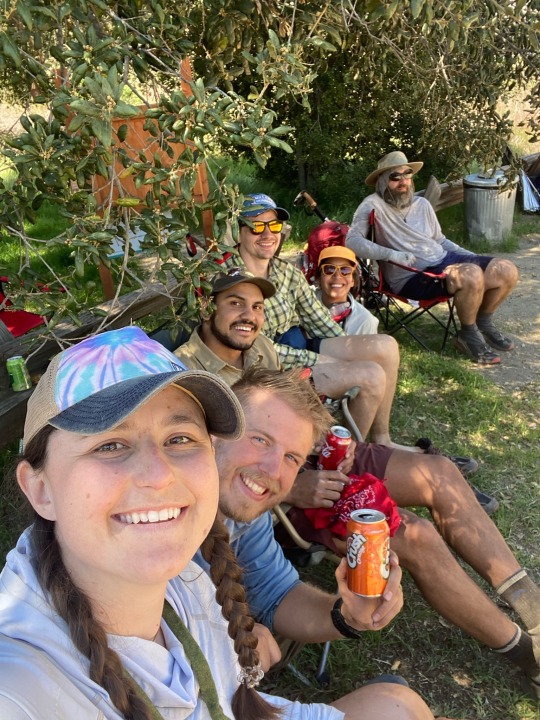
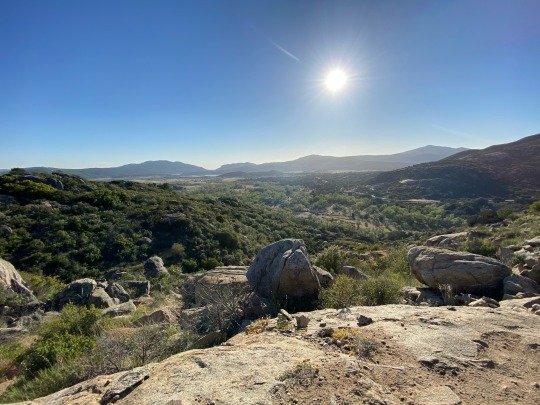
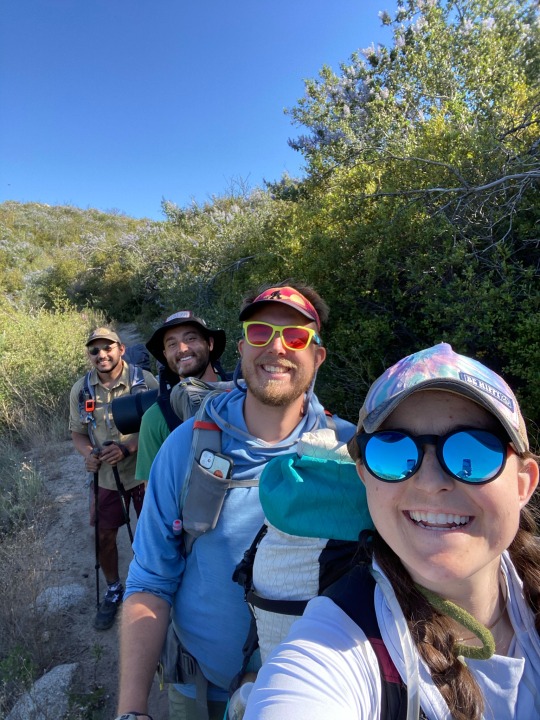
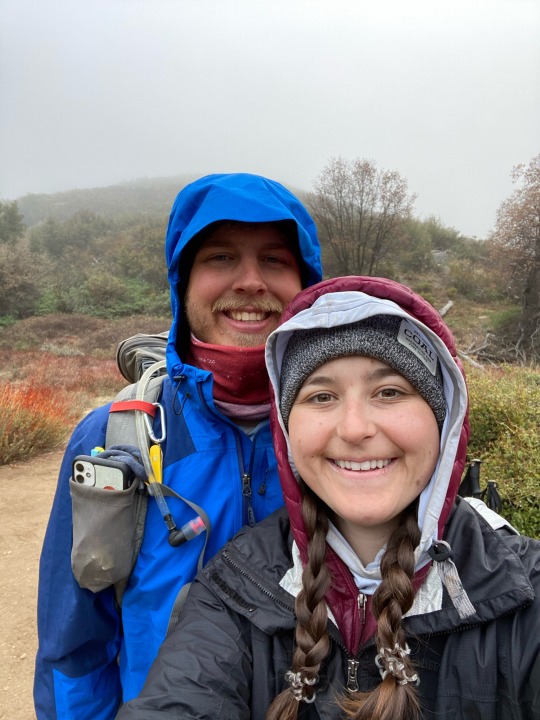
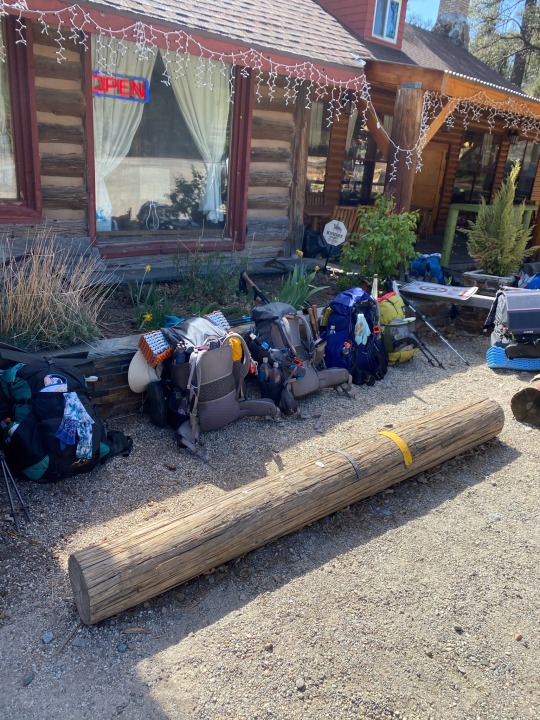
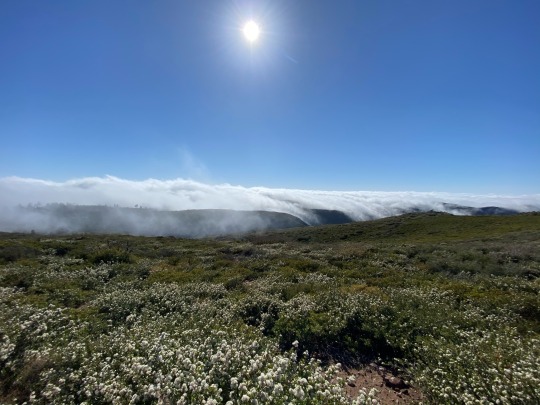
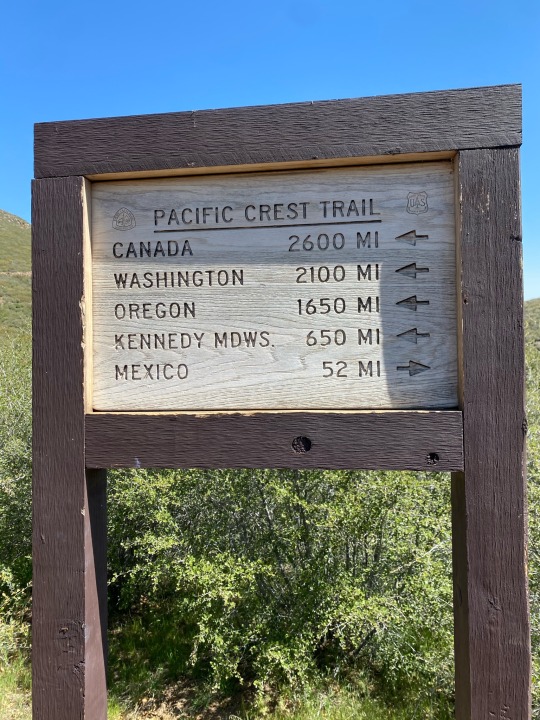


0 notes